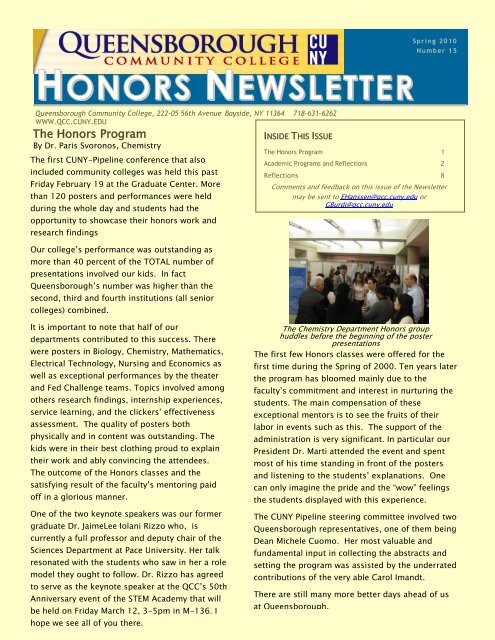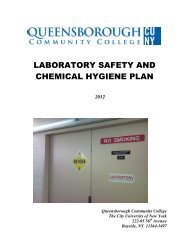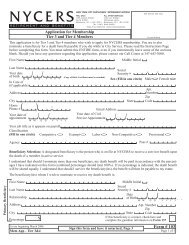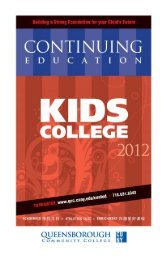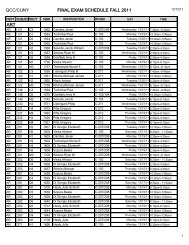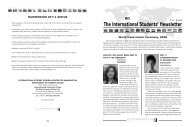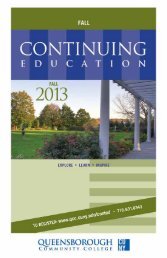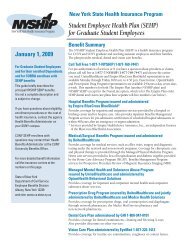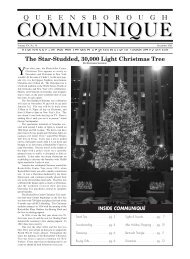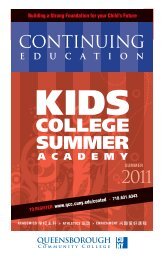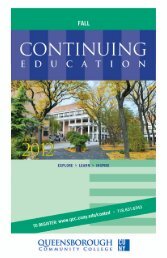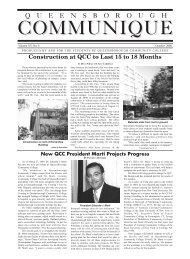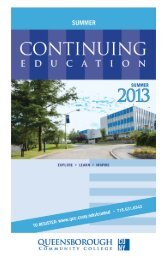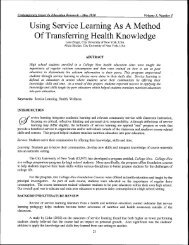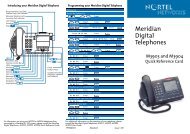Spring '10 Honors Newsletter (PDF) - Queensborough Community ...
Spring '10 Honors Newsletter (PDF) - Queensborough Community ...
Spring '10 Honors Newsletter (PDF) - Queensborough Community ...
Create successful ePaper yourself
Turn your PDF publications into a flip-book with our unique Google optimized e-Paper software.
<strong>Spring</strong> 20 10<br />
Number 15<br />
HONORS NEWSLETTER<br />
<strong>Queensborough</strong> <strong>Community</strong> College, 222-05 56th Avenue Bayside, NY 11364 718-631-6262<br />
WWW.QCC.CUNY.EDU<br />
The <strong>Honors</strong> Program<br />
By Dr. Paris Svoronos, Chemistry<br />
The first CUNY-Pipeline conference that also<br />
included community colleges was held this past<br />
Friday February 19 at the Graduate Center. More<br />
than 120 posters and performances were held<br />
during the whole day and students had the<br />
opportunity to showcase their honors work and<br />
research findings<br />
Our college’s performance was outstanding as<br />
more than 40 percent of the TOTAL number of<br />
presentations involved our kids. In fact<br />
<strong>Queensborough</strong>’s number was higher than the<br />
second, third and fourth institutions (all senior<br />
colleges) combined.<br />
INSIDE THIS ISSUE<br />
The <strong>Honors</strong> Program 1<br />
Academic Programs and Reflections 2<br />
Reflections 8<br />
Comments and feedback on this issue of the <strong>Newsletter</strong><br />
may be sent to EHanssen@qcc.cuny.edu or<br />
GBurdi@qcc.cuny.edu<br />
It is important to note that half of our<br />
departments contributed to this success. There<br />
were posters in Biology, Chemistry, Mathematics,<br />
Electrical Technology, Nursing and Economics as<br />
well as exceptional performances by the theater<br />
and Fed Challenge teams. Topics involved among<br />
others research findings, internship experiences,<br />
service learning, and the clickers’ effectiveness<br />
assessment. The quality of posters both<br />
physically and in content was outstanding. The<br />
kids were in their best clothing proud to explain<br />
their work and ably convincing the attendees.<br />
The outcome of the <strong>Honors</strong> classes and the<br />
satisfying result of the faculty’s mentoring paid<br />
off in a glorious manner.<br />
One of the two keynote speakers was our former<br />
graduate Dr. JaimeLee Iolani Rizzo who, is<br />
currently a full professor and deputy chair of the<br />
Sciences Department at Pace University. Her talk<br />
resonated with the students who saw in her a role<br />
model they ought to follow. Dr. Rizzo has agreed<br />
to serve as the keynote speaker at the QCC’s 50th<br />
Anniversary event of the STEM Academy that will<br />
be held on Friday March 12, 3-5pm in M-136. I<br />
hope we see all of you there.<br />
The Chemistry Department <strong>Honors</strong> group<br />
huddles before the beginning of the poster<br />
presentations<br />
The first few <strong>Honors</strong> classes were offered for the<br />
first time during the <strong>Spring</strong> of 2000. Ten years later<br />
the program has bloomed mainly due to the<br />
faculty’s commitment and interest in nurturing the<br />
students. The main compensation of these<br />
exceptional mentors is to see the fruits of their<br />
labor in events such as this. The support of the<br />
administration is very significant. In particular our<br />
President Dr. Marti attended the event and spent<br />
most of his time standing in front of the posters<br />
and listening to the students’ explanations. One<br />
can only imagine the pride and the “wow” feelings<br />
the students displayed with this experience.<br />
The CUNY Pipeline steering committee involved two<br />
<strong>Queensborough</strong> representatives, one of them being<br />
Dean Michele Cuomo. Her most valuable and<br />
fundamental input in collecting the abstracts and<br />
setting the program was assisted by the underrated<br />
contributions of the very able Carol Imandt.<br />
There are still many more better days ahead of us<br />
at <strong>Queensborough</strong>.
Page 2<br />
<strong>Queensborough</strong> <strong>Honors</strong> <strong>Newsletter</strong><br />
The <strong>Honors</strong> Program Library Workshop<br />
Students participating in the QCC <strong>Honors</strong> Program are required to take a Library Research Workshop.<br />
The Workshop enhances existing skills and offers options in developing new research methods.<br />
The Workshop provides students with a forum to discuss their research techniques, share research<br />
strategies with other participants, learn new methods in selecting and evaluating sources, along with<br />
learning about the research support network available to them at the QCC Library.<br />
Library Workshop components include:<br />
Evaluating Internet Websites<br />
Legal and Ethical Use of Sources<br />
Online Database Searching<br />
Primary versus Secondary Sources<br />
Use of CUNY+PLUS Online Catalog<br />
A recent survey was conducted about The <strong>Honors</strong> Program Library Workshop and the Top Ten<br />
comments from the QCC <strong>Honors</strong> Student completing the workshop are:<br />
I did not know I could access The New York Times from 1851.<br />
Did not know about the online databases and that they were full-text…online newspapers<br />
and journals.<br />
I learned what a Boolean search is.<br />
I learned what periodicals are.<br />
Navigation of available resources from the CUNY library.<br />
That we have databases available to us and we can borrow books from other CUNY libraries.<br />
How to do an advanced search in GOOGLE and select a specific domain.<br />
The difference between HTML and <strong>PDF</strong> files.<br />
How important the source is that we use for our research.<br />
I did not know there are more resources than GOOGLE or Wikipedia.<br />
The Student <strong>Honors</strong> Library Program workshop will not only help the <strong>Honors</strong> Student while in<br />
attendance at QCC, but will serve as a tremendous resource during the student’s academic research<br />
experience.<br />
<strong>Honors</strong> English EN445<br />
By Dr. Sheena Gillespie<br />
In my honors section of EN445 we discussed<br />
several texts by writers from different cultures<br />
including Kate Chopin, Franz Kafka, Federico<br />
Garcia Lorca, Albert Camus, and Toni Morrison.<br />
The students quoted below were never absent,<br />
always prepared, offered insightful comments, and<br />
wrote excellent critical analyses of the authors<br />
they chose for their research project. I feel<br />
privileged to have spent the semester enriched by<br />
their wisdom.<br />
Bevon Lewis "enjoyed being able to write about<br />
topics as I saw fit. The discussions were intelligent,<br />
thought-provoking, and allowed students to express<br />
their honest opinions. Roland Hanak wrote that "this<br />
class doesn't teach you, it teaches you to think."<br />
Samantha Panisse "enjoyed the brilliance of my<br />
fellow students, learned a lot, and exercised my<br />
mind more than I would have in a standard class."<br />
Febia B. Jackson wrote that" Dr. Gillespie challenged<br />
our minds and pushed us to think outside the box<br />
which was more rewarding for our personal outlook<br />
towards life, rather than just our grade for the<br />
semester. Truly a rewarding experience which placed<br />
a strong emphasis on individuality and yet never left<br />
anyone feeling disconnected."
<strong>Queensborough</strong> <strong>Honors</strong> <strong>Newsletter</strong><br />
My Association with the <strong>Honors</strong> Classes in Chemistry Department:<br />
First the Teaching; Now the Research<br />
By Soraya Svoronos, Ph.D. Adjunct Associate Professor Chemistry Department<br />
I have been associated with <strong>Honors</strong> classes in the<br />
Chemistry Department since their inception in 2000.<br />
It is certainly a great experience to see the academic<br />
development of our <strong>Queensborough</strong> students via this<br />
program. I have witnessed this during the first four<br />
Annual QCC <strong>Honors</strong> Conferences where my students<br />
made power point presentations. At the beginning<br />
these students have absolutely no interest in<br />
chemistry. At the end of the semester these same<br />
individuals are ready to stand for 15 minutes and talk<br />
about a specific topic they have picked out of the<br />
course syllabus.<br />
In January 2009 I was involved in a research project<br />
with a student in the chemistry department in which<br />
we measured the quantitative determination of the<br />
antioxidant gallic acid in tea beverages. The student,<br />
Rana Said, presented her findings first at the 5th<br />
Page 3<br />
Annual <strong>Honors</strong> QCC Conference in April and at the<br />
57th Undergraduate Research Symposium of the<br />
American Chemical Society- NY section on May 2 at<br />
Pace University both in power point form. Rana also<br />
presented her work as a poster, at the 238th<br />
National American Chemical Society Meeting in<br />
Washington DC in August.<br />
Over the years I have taught as an adjunct in at least<br />
four different senior colleges and have never<br />
detected the interest in mentoring by basically all<br />
full time faculty that is evident in <strong>Queensborough</strong>’s<br />
Chemistry Department. The students have extensive<br />
research and internship opportunities through the<br />
<strong>Honors</strong> Program that solidify their perception of the<br />
true scientific world they will encounter as<br />
professionals upon graduation.<br />
<strong>Queensborough</strong> Mock Trial Team Competes in Regional Tournament<br />
By Prof. Ted Rosen<br />
At the 2010 Atlantic Regional Tournament of the<br />
American Mock Trial Association, held at St. John’s<br />
University from February 26th through February<br />
28th, the <strong>Queensborough</strong> <strong>Community</strong> College<br />
Mock Trial Team competed against the 27 teams<br />
from 16 colleges in the tournament.<br />
.<br />
The <strong>Queensborough</strong> <strong>Community</strong> College, the only<br />
community college in the tournament, competed<br />
in the Atlantic Regional for the third straight year,<br />
finishing with 3 wins, 4 losses and 1 tie. The<br />
<strong>Queensborough</strong> <strong>Community</strong> College team<br />
defeated City College of New York as well as<br />
Stonybrook University, and distinguished itself by<br />
being very competitive in all of its matches. In<br />
preparation for the tournament the team<br />
participated in nine scrimmages during the<br />
months preceding the event.<br />
Each of the teams competing in the tournament<br />
conducted the trial of the same case, twice from<br />
the plaintiff’s side and twice from the<br />
defendant’s side. The students on the teams<br />
participated as attorneys, presenting opening<br />
and closing statements and engaging in direct<br />
and cross-examination of witnesses, and as<br />
one of nine possible witnesses involved in the<br />
case.<br />
All students who are interested in participating<br />
in future Mock Trial events should contact<br />
Professor Ted Rosen in the Business<br />
Department at (718) 281-5488, or at<br />
trosen@qcc.cuny.edu.
Page 4<br />
<strong>Queensborough</strong> <strong>Honors</strong> <strong>Newsletter</strong><br />
<strong>Honors</strong> Contracts in Psychology: A Different Experience at <strong>Queensborough</strong>!<br />
By Dr. Jeffrey Jankowski<br />
Mentoring students who are conducting honors<br />
contracts is a rewarding experience. An honors<br />
contract offers students the opportunity to research<br />
an idea guided closely by a faculty member. In my<br />
case, the student many times intends to pursue a<br />
baccalaureate and a graduate degree in psychology.<br />
As such, the contract can be molded around the<br />
student’s interest as well as the course content to<br />
further knowledge into the area.<br />
In addition, the student gains experience reporting<br />
the findings of their work at the QCC <strong>Honors</strong><br />
Conference. For many students, this is the first<br />
opportunity to conduct independent study working<br />
closely with a faculty member. Not only does the<br />
experience allow students to explore interests but<br />
also to consider more carefully future education and<br />
career plans.<br />
Can QCC Calculus II <strong>Honors</strong> Students Make Mathematical Theorems Dance and Talk?<br />
By Cristina Abreu-Suzuki, Ph.D., Mathematics<br />
I first taught a Calculus II honors class at QCC in<br />
<strong>Spring</strong> 2008. In the very beginning of the course I<br />
realized that the students were well prepared and<br />
intellectually curious. The learning environment that<br />
an honors course provides allowed me to expose my<br />
enthusiasm and passion for teaching mathematics<br />
while I decided to experiment with different<br />
techniques by using computer laboratory material.<br />
Calculus II students must learn and use the software<br />
MAPLE which has a wide variety of applications in<br />
many areas of knowledge including Physics<br />
and Engineering. When I first proposed the<br />
students to produce original results using the same<br />
MAPLE that they were studying in the lab and to<br />
present their creation at the QCC <strong>Honors</strong><br />
Conference, they were a bit skeptical...but their<br />
hunger for challenging experiences were louder<br />
than any reluctant tendencies that would cross their<br />
minds.<br />
The students executed two big projects: "Explaining<br />
how MAPLE was used to graphically simulate an<br />
earthquake and the effect of wind load hitting<br />
skyscrapers in two works of Thomas Stoll and Klaus<br />
Thni ". Those honors<br />
students grew more and more enthusiastic about<br />
their final project. They adapted the original work<br />
creating animations of their own which were<br />
successfully presented at the <strong>Honors</strong> Conference.<br />
In the <strong>Spring</strong> 2009 I found myself experimenting<br />
once more, this time with students who wanted to<br />
complete <strong>Honors</strong> Contracts in a standard Calculus II<br />
class. Those students executed one big project<br />
explaining how MAPLE was used to create sounds in<br />
the work Creating Sound Sample Files using Maple 6<br />
by Paul Goossens. In that <strong>Spring</strong> 2009<br />
Calculus II class I detected the same reaction of the<br />
<strong>Spring</strong> 2008 honors students: from skeptical to<br />
eager users of MAPLE. Needless to say that the<br />
students created their own original sounds.<br />
At the <strong>Honors</strong> Conference they successfully<br />
presented their analysis of the original work and<br />
they masterfully ended their presentation playing<br />
the sounds that they created. Finally, as for the<br />
answer to the title question: yes, QCC Calculus II<br />
honors students can make mathematical theorems<br />
dance and talk, They just need to be contaminated<br />
with passion and enthusiasm for mathematics.
<strong>Queensborough</strong> <strong>Honors</strong> <strong>Newsletter</strong><br />
Page 5<br />
2009-2010 Fed Challenge Team<br />
By Ed Hanssen<br />
Congratulations to the 2009 QCC Fed Challenge<br />
Team for having won the community college<br />
competition for the New York District regional and<br />
third place in the national community college<br />
competition.<br />
The Fed Challenge is a nationwide intercollegiate<br />
competition sponsored by the regional Federal<br />
Reserve offices, with the winner of each region<br />
competing in a national final competition held in<br />
Washington D.C. in December. This is the seventh<br />
year of the college competition, and the third year<br />
that two year schools compete in their own division.<br />
The New York regional competition was held at<br />
the Federal Reserve building in downtown NYC.<br />
The list of twenty three area colleges competing<br />
included Rutgers, Princeton, Baruch, and West<br />
Point.<br />
The objective of the competition is to promote<br />
understanding of our Federal Reserve System<br />
among college students, and while our team<br />
members did not qualify for the next round of the<br />
competition they certainly achieved this objective.<br />
Left to Right: Teresa Brunetti, Josh Voltaire,<br />
Sandeep Singh, and Lorik Jakupi.<br />
The 2009 team is special because of who they<br />
are and how they came together as team. All<br />
team members are working students. All of<br />
them came from different backgrounds and<br />
through hard work and working together<br />
became a team with each person supporting<br />
one another. We are proud of what they<br />
accomplished and who they became in the<br />
process.<br />
The team is sponsored by the Business<br />
Department and the QCC <strong>Honors</strong> Committee.<br />
Faculty advisors are Assistant Professors<br />
Christine Mooney (CMooney@qcc.cuny.edu), Ed<br />
Hanssen (EHanssen@qcc.cuny.edu) and Linda<br />
Meltzer (LMeltzer@qcc.cuny.edu).<br />
<strong>Queensborough</strong> <strong>Community</strong> College<br />
Presents the<br />
Sixth Annual <strong>Honors</strong> Conference<br />
Celebrating Student Research and Academic Life<br />
Friday, April 23, 2010<br />
8:30AM to 12 Noon<br />
Medical Arts Building – First Floor and Basement<br />
www.qcc.cuny.edu
Page 6<br />
<strong>Queensborough</strong> <strong>Honors</strong> <strong>Newsletter</strong><br />
Research Opportunity of <strong>Honors</strong> Class Students<br />
By Dr. Jun H. Shin, Associate Professor, Chemistry<br />
When I mention the students’ undergraduate research in<br />
<strong>Queensborough</strong>’s chemistry department to four year<br />
college faculty members, I am usually stared upon with<br />
curiosity. However when I continue to say that our<br />
undergraduate students regularly participate at national<br />
and regional conferences where they present their<br />
research results, their eyes open wide with unexpected<br />
surprise. Yes, undergraduate research at a community<br />
college is rare and uncommon. Presenting research<br />
findings at a national conference as a main author?<br />
“Priceless!”<br />
When I joined the chemistry department at QCC five and<br />
a half years ago, it was very difficult for me to find a<br />
student who wanted to conduct research because it was<br />
extra work for them to do without course credit. Now I<br />
have to find a nice and polite way to say “I have no more<br />
room for extra students.” Many of our honors class<br />
students are involved in research every year because<br />
taking an honors class may be a good pathway to join a<br />
research group. As research students, they are exposed<br />
to modern technology such as FT-NMR, FT-IR, UV-Vis,<br />
SEM, HPLC, MS-GC and x-ray fluorescence as a firsthand<br />
user which is, of course, unheard of to any first or<br />
second year undergraduate students<br />
(www.qcc.cuny.edu/Chemistry/instrument.asp).<br />
Every year the research student and his/her mentor<br />
in our department go to professional conferences.<br />
Twenty five (25) students had poster presentations at<br />
the National American Chemical Society Meeting, the<br />
largest chemistry conference in the world, at<br />
Washington DC last summer<br />
(www.qcc.cuny.edu/Chemistry/ACS_2009.asp). A<br />
research presentation is a good thing to add in a<br />
resume, but more important it benefits the building<br />
of confidence through experimentation and<br />
presentation. Many students look nervous and even<br />
scared before their first conference, but later I see<br />
them enjoying their achievement. Also some of them<br />
have an opportunity to publish their research results<br />
in a professional journal<br />
(www.qcc.cuny.edu/Chemistry/publications.asp). In<br />
an honors class, a student will find the opportunity<br />
and experience never expected otherwise.<br />
Members of the <strong>Honors</strong> Committee<br />
Christina Abreu-Suzuki<br />
Aithne Bialo-Padín<br />
Glenn Burdi<br />
Michele Cuomo<br />
Karen Gapper<br />
Ed Hanssen<br />
Andrew Levy<br />
Susan Sciammarella<br />
Regina Sullivan<br />
Paris Svoronos<br />
Eileen Whte
<strong>Queensborough</strong> <strong>Honors</strong> <strong>Newsletter</strong><br />
Page 7<br />
The 238th National American Chemical Society Meeting:<br />
An Enlightening Experience for our Students<br />
By Paris Svoronos<br />
The 238th NATIONAL American Chemical Society<br />
Meeting was held in Washington DC August 16-20<br />
2009. August 17, was the day scheduled for the<br />
undergraduate research poster session. This event<br />
highlighted the students standing in front of their<br />
posters and defending their research findings and<br />
interpretations to visiting participants of the<br />
conference.<br />
There were exactly 200 undergraduate posters<br />
accepted for presentation. The Chemistry<br />
Department had 25 posters (12.5% of the total) -<br />
the highest number among any participating college<br />
or university. <strong>Queensborough</strong> was also the only<br />
community college that had students in this<br />
event. This was an exceptionally gratifying<br />
experience that I consider the pinnacle of teaching,<br />
learning and modifying the students’ lives. I was<br />
proud to see our freshmen and sophomores stand<br />
in their best attire displaying the maturity, behavior<br />
and knowledge in a manner no different than that of<br />
any junior or senior in a four-year college.<br />
First Annual Business Academy Ethics<br />
Essay Contest Winners Announced<br />
The effort involved the collaborative work of all<br />
nine chemistry full timers (Drs. Sasan Karimi,<br />
Irina Rutenburg, Moni Chauhan, Sharon Lall-<br />
Ramnarine, David Sarno, Jun Shin, Mihaela<br />
Bojin, Tirandai Hemraj-Benny and myself) and<br />
three CLTs (Pedro Irigoyen, Bruce Montalbano<br />
and Andrew Xu). It also included four adjuncts<br />
(Drs. Gopal Subramaniam, Soraya Svoronos,<br />
Luis Vargas and Jordan Verdis). And for the first<br />
time there was a joined work of a Biologist (Dr.<br />
Mangala Tawde) and a chemist (Dr. Moni<br />
Chauhan). The research findings were obtained<br />
during the intersession and spring break.<br />
The faculty transformed students who were<br />
unsure of their academic future and their<br />
potential into future scientists who can<br />
compete at a comparable senior level. These<br />
faculty are not lecturers- they are teachers and<br />
mentors. Who says that <strong>Queensborough</strong> cannot<br />
make <strong>Honors</strong> students?<br />
Monday August 17, 2009 was a good day for<br />
<strong>Queensborough</strong>. There are better days ahead of<br />
us.<br />
The winners of the 2010 Business Academy Essay<br />
Contest are:<br />
First Place: Tasia Lawrence (Environmental)<br />
Second Place: Teresa Brunetti Lihach<br />
(Whistleblowing)<br />
Third Place: Yiu Bun Benny, Mok<br />
(Workplace Discrimination)<br />
They will be presenting their research and papers<br />
on March 18th (2-6 in M136) at the 50th<br />
Anniversary Event for the Business Academy called<br />
"Students Voice their Values on Ethics".<br />
Gurpreet Singh (left) and Kenny Wong (third from left) with<br />
their mentor Chemistry’s Dr Tirandai Hemraj-Benny (second<br />
from left)
Page 8<br />
<strong>Queensborough</strong> <strong>Honors</strong> <strong>Newsletter</strong><br />
Changing from a Quick Transfer to Graduation:How the <strong>Honors</strong> Program Changed<br />
my Mind By Eunchul Kim<br />
conferences and meetings with fellow students<br />
When I first came to <strong>Queensborough</strong> <strong>Community</strong><br />
College, I really wanted to transfer to a four-year<br />
engineering school the following semester. At that time,<br />
my motivation was dying out and all I wanted was to get<br />
out and go through some change. I thought the only<br />
way to achieve that was to transfer to a four-year<br />
institution as soon as possible.<br />
At first, I talked to Dr. Paris Svoronos to register for a<br />
regular General Chemistry course just because it was a<br />
transferrable part of my pre-engineering curriculum. He<br />
looked at my records and started talking about <strong>Honors</strong><br />
General Chemistry, conducting research under the<br />
guidance of a faculty mentor, and how those<br />
experiences can change my college life. I became<br />
excited and instantly decided to take the challenge. It<br />
turned out that I went through the change that would<br />
never go away right here in the Chemistry Department.<br />
Now I can tell you that the day was one of the major<br />
turning points in my life and every single experience I<br />
have had in the department up until now contributed to<br />
changing me to my present status.<br />
From the first semester of <strong>Honors</strong> General Chemistry I,<br />
I started getting trained for research on the Synthesis of<br />
TTPI (3-trimethoxysilylpropyl isocyanurate) stabilized<br />
transition metal nanoclusters under the guidance of Dr.<br />
Moni Chauhan. I should mention that the experience of<br />
conducting research as an undergraduate is an<br />
exceptional opportunity and having it in a community<br />
college is almost unknown to all other institutions.<br />
Having a faculty mentor who always welcomes you<br />
when you knock on the door and cares about your<br />
personal development is a very special opportunity. I<br />
worked in a very nice newly equipped research lab<br />
which made me look and feel professional, learned to<br />
carry out reactions and to use various spectroscopic<br />
instruments to analyze the experimental results. I was<br />
able to become an active part of an original research<br />
project, discuss the results with my mentor and learned<br />
to think analytically and scientifically. It was hard and<br />
time-consuming to prepare presentations and posters<br />
for meetings and conferences, but those were the times<br />
that I learned the most about my research. I also have<br />
to mention that the travels to<br />
and faculty members as well as communicating<br />
with the scientific community were<br />
extraordinary experiences that made me feel<br />
very professional and enthusiastic. All these<br />
add to extra nice “records” that would make my<br />
resume stand out from the crowd too. You<br />
must believe that these are the things that I did<br />
not think I would be able to do before I met Dr.<br />
Svoronos.<br />
I have personally presented my own research<br />
findings in six different American Chemical<br />
Society (ACS) meetings including two National<br />
Meetings in Philadelphia and Washington DC,<br />
as well as two QCC <strong>Honors</strong> Conferences. I was<br />
also featured at the official ACS periodical<br />
(Chemical and Engineering News) in a photo.<br />
I must also talk about the classroom experience<br />
from the <strong>Honors</strong> Chemistry courses. In the<br />
classroom, I was constantly motivated and<br />
challenged with assignments and frequent<br />
tests. These requirements were not easy at all,<br />
but the rewards you get from achieving the<br />
goals and meeting expectations more than<br />
compensate for the hard work. Dr. Svoronos<br />
makes extra efforts to make his students work<br />
harder, be responsible, and stay motivated. He<br />
works passionately to offer his students<br />
chances to realize their potentials. I really<br />
needed to get rid of my lazy habits and had to<br />
force myself to work hard, and in the process I<br />
realized that I could do more than I ever<br />
thought. At the end of each challenging<br />
semester, I found myself growing confident to<br />
face even worse challenges. Becoming a part of<br />
an inner community of enthusiastic and<br />
motivated students that receives special<br />
attention from faculty members is a privilege<br />
that only <strong>Honors</strong> Chemistry students can enjoy.<br />
Now I want to say confidently that every single<br />
semester that I have spent in the chemistry<br />
department has helped me to set out my long<br />
term goal and prepare a solid foundation for it.<br />
It is certainly a life-changing experience.
<strong>Queensborough</strong> <strong>Honors</strong> <strong>Newsletter</strong><br />
Page 9<br />
How the <strong>Honors</strong> Program has Changed my Life<br />
By Darryl Williams<br />
The <strong>Honors</strong> Program at <strong>Queensborough</strong> <strong>Community</strong><br />
College had a tremendous effect on my entire career<br />
path. The program pushes you beyond what you<br />
initially thought was your uppermost limits to find<br />
out that there is really no limit. The <strong>Honors</strong> Program<br />
taught me amazing discipline and opened my eyes<br />
to a vast world of possibilities. With the program I<br />
was able to take part in a rewarding Biology<br />
research project under Dr. Raji Suramaniam and<br />
present my findings at various national conferences.<br />
Moreover, I was fortunate to gain an internship with<br />
the Department of Environmental Protection<br />
for the summer of 2009 where I learned about<br />
various sampling and research techniques on<br />
water treatment. Within the program I gained a<br />
new and very large family in which I can turn to<br />
for just about anything. I view<br />
<strong>Queensborough</strong>’s <strong>Honors</strong> Program as an<br />
academic boot camp. Once you are through<br />
with it the possibilities around you are<br />
incredible so you better hold on. I can feel the<br />
impact in my current studies at Queens College<br />
where I am currently a junior.<br />
Working on Organic Synthesis Research as Part of the <strong>Honors</strong> Program<br />
By Renzo A. Samame, B.A in Chemistry<br />
The <strong>Honors</strong> and Research Program at<br />
<strong>Queensborough</strong> was an exciting and rewarding<br />
experience as an undergraduate student. During<br />
that time I was assigned to work under Dr. Luis<br />
Vargas in the synthesis and design of an<br />
anticancer alkylating agent. Over the course of<br />
two semesters, I synthesized a compound that<br />
combined two properties, an anticancer alkylating<br />
agent and the inclusion of a bisphosphonate<br />
group, known for its ability to inhibit osteoclastic<br />
(i.e., bone) resorption.<br />
This opportunity not only provided bench work<br />
exposure but certainly created a bridge from the<br />
regular class setting to where science really takes<br />
place (the laboratory). In addition to the technical<br />
lessons I learned, coupled with the challenges of, at<br />
times, discouraging results, I realized that the<br />
beauty of chemistry research is not only to prove<br />
theoretical or applied analysis but to make us aware<br />
of our capabilities. As I transferred to a four college,<br />
such experience helped me gain a seat in a<br />
medicinal chemistry laboratory and my subsequent<br />
eligibility for a Bachelors degree with Chemistry<br />
<strong>Honors</strong>.<br />
<strong>Queensborough</strong> Chemistry Research is for the<br />
curious, motivated and hard working students who<br />
are fortunate to have a unique and caring faculty.<br />
As a unique experience I had the opportunity of<br />
meeting and taking a photo with Elias James Corey<br />
(E.J. Corey) the 1990 Nobel laureate in Chemistry.<br />
Attending the Seminars and Lectures of Scientists: An Impact Way for<br />
Improving my Abilities<br />
By Sahara Refua<br />
The Chemistry <strong>Honors</strong> program gives you the<br />
chance to go and listen to seminars given by<br />
scientists invited by the department to address<br />
faculty and students. These seminars give you<br />
information about the field that you have no idea<br />
about. This experience helps you find out what<br />
kind of career you are interested in. During my<br />
three semester career at <strong>Queensborough</strong> I have a<br />
minimum of twelve seminars that include<br />
everything from Environmental Forensics to the<br />
Determination of the Age of Sushi in restaurants to<br />
the theoretical way of calculating distances and<br />
angles of molecules.I had the opportunity to also<br />
work on theoretical chemistry research with Dr.<br />
Jordan Verdis and presented my findings at the<br />
238th National meeting of the American Chemical<br />
Society in Washington DC last August.
Page 10<br />
<strong>Queensborough</strong> <strong>Honors</strong> <strong>Newsletter</strong><br />
A Summer Internship at the Division of Environmental Protection (D.E.P)<br />
By Katie Lee<br />
I first joined the <strong>Honors</strong> program at <strong>Queensborough</strong> last<br />
<strong>Spring</strong> and registered for <strong>Honors</strong> General Chemistry I.<br />
Through this experience I was able to be named for an<br />
ATE Internship at the D.E.P. (Department of<br />
Environmental Protection) for the summer of 2009. The<br />
work was done at the Owl’s Head Lab for the Waste<br />
Water Treatment facility. So far this has been one of my<br />
most rewarding experiences. I had the privilege to work<br />
inside a chemistry lab where I have performed various<br />
chemistry related tasks, such as measuring the pH and<br />
the chloride concentrations of water. I also prepared<br />
samples and performed argentometric titrimetric<br />
measurements.<br />
This opportunity has given me the chance to<br />
work with other professional chemists and<br />
gain more knowledge about hands-on, every-day<br />
related chemistry. It also taught me how our<br />
waste water is processed and the different<br />
experiments involved before it can be available<br />
to the public. I now know and feel safe that the<br />
water quality in New York City is of primary<br />
quality.<br />
Being Involved in <strong>Honors</strong> Experiences with the Chemistry Department<br />
By Ti-Ya Chang<br />
I took <strong>Honors</strong> General Chemistry 151 in the<br />
<strong>Spring</strong> 2008, which was expected to be a very<br />
challenging course. The professor of this class<br />
was Dr. Paris Svoronos, and I am sure he<br />
expected all of us to achieve an A in this course.<br />
During the lecture class, the professor shared his<br />
knowledge with students, and students shared<br />
what they knew with each other after the class. I<br />
received absolute cooperation and great<br />
participation from this class.<br />
In the summer of 2008, Dr. Svoronos encouraged<br />
students to serve as interns at the Department of<br />
Environmental Protection (DEP), which was a very<br />
interesting and useful experience. First of all, I<br />
was required to learn the process of analyzing<br />
water, and then I learned to analyze the data of<br />
the samples from each water factory and the<br />
various laboratories. Additionally, I assisted<br />
several chemists in their tasks. I had to type the<br />
data and categorize the samples. I thought that<br />
the chemists were very serious, quiet and wore<br />
dull glasses. However, the situation was very<br />
different. The scientists actually loved to share<br />
their experience when they were students, they<br />
were really friendly and patient when they taught<br />
and explained to me the details of the various<br />
analyses. From various conversations with them,<br />
I could see the passion of being a chemist, and<br />
this experience also helped me reassure my life<br />
goal. I did not regret spending my summer at<br />
DEP, because I did learn and I did enjoy it.<br />
Of course, it is not easy to get an A inan <strong>Honors</strong><br />
class. It requires students not only to thoroughly<br />
concentrate on studying but also to completely<br />
enjoy the moment of gaining knowledge.<br />
Studying is fun! Furthermore, seminars which are<br />
held every month by the Chemistry Department<br />
are really interesting because they give you the<br />
chance to know what is going on outside the<br />
textbook, and they also provide the<br />
opportunities to realize how to apply what we<br />
learned in our daily lives! I truly appreciate that I<br />
got the chance to be a student in honors classes<br />
now that I am a QCC alumnus and a current John<br />
Jay student.
<strong>Queensborough</strong> <strong>Honors</strong> <strong>Newsletter</strong><br />
Page 11<br />
Taking <strong>Honors</strong> Classes at <strong>Queensborough</strong>: How this Experience Expands the<br />
Student’s Academic Horizon<br />
By Eva Maria Santos Tejada<br />
The honors courses at <strong>Queensborough</strong> consist of<br />
small size classes. Even though one may initially<br />
feel scared, this experience provides individuals<br />
with an excellent opportunity to directly interact<br />
with the instructors. This program is challenging<br />
because it engages the student’s commitment and<br />
dedication. In my experience, honors courses had<br />
challenged me academically and personally, since<br />
the classes are more intense than any other<br />
regular section. However, the results are<br />
extraordinarily worthy.<br />
First this section academically allows students to<br />
expand their horizons when pursuing their fields.<br />
Second, the interaction with the instructors creates<br />
a strong bond of friendship, respect and trust<br />
between the faculty and the student. It also helps<br />
students to develop critical thinking in the area the<br />
course is related. For instance, honors students<br />
in the chemistry department are required to<br />
attend certain seminars during the semester,<br />
where they have to write a summary of the talk.<br />
Although this is challenging because some<br />
topics are way beyond the student’s knowledge<br />
and background, this experience still allows the<br />
student to think as a scientist. Finally, I<br />
encourage all students who want to take this<br />
challenge to try and make a difference in their<br />
own lives. The benefits acquired through the<br />
experience of this program will lead to<br />
successful graduates who will have more<br />
opportunities in their lives on and off campus<br />
in the future.<br />
As a graduate of <strong>Queensborough</strong> and a junior<br />
in Forensics at John Jay College I truly<br />
appreciate my <strong>Honors</strong> opportunities at<br />
<strong>Queensborough</strong>.<br />
Starting a second career at <strong>Queensborough</strong> through the <strong>Honors</strong> Courses<br />
By Ernest Choi<br />
General Chemistry 151 <strong>Honors</strong> was the first class<br />
I took at QCC. It was difficult for me to grasp how<br />
the honors classes were different from the<br />
traditional classes offered. I did not have much<br />
experience in the sciences as my academic career<br />
primarily revolved around business and<br />
finance. However, as the semester progressed,<br />
two experiences lead me to conclude that the<br />
honors chemistry course at QCC offers a<br />
significant advantage over some of the non<br />
honors level courses.<br />
The first experience was tutoring some of the<br />
introductory level chemistry courses. I had little to<br />
no experience in chemistry and any experience in<br />
it would date back to the mid 90's when I was<br />
attending high school. However, through the<br />
knowledge I gained in the CH151 honors class,<br />
I was able to successfully tutor students<br />
who were having trouble in their classes. In fact,<br />
there are a number of CH151 students who come to<br />
my tutoring sessions and who have been able to<br />
receive the help they needed. Of course, there were<br />
some topics that had not yet been discussed in the<br />
CH 151 honors course that required attention.<br />
However, through the strong base of knowledge<br />
acquired in this honors course, I was able to use key<br />
concepts to work out problems with the students.<br />
Second, as I have been reviewing some study guides<br />
for the DATs and MCATs, I realize that the practical<br />
application of chemistry theory and concepts<br />
learned in the CH 151 honors class will provide me<br />
with the building blocks required to take these<br />
standardized exams and perform well.
Page 12<br />
<strong>Queensborough</strong> <strong>Honors</strong> <strong>Newsletter</strong><br />
How the <strong>Honors</strong> Program in Chemistry Helped me Get an Internship at<br />
Broohaven Labs this Past Summer<br />
By Parsa Sharifi<br />
With the help of a STEM grant whose PI is Dr. Paris<br />
Svoronos, the Chair of the Chemistry Department<br />
at <strong>Queensborough</strong>, I was able to experience<br />
researching with actual research scientists at<br />
Brookhaven National Labs. This was a<br />
tremendously amazing experience. I researched<br />
with Dr. Lars Ehm on the synthesis of water<br />
splitting oxynitrides to produce hydrogen gas with<br />
the intention to use it as a clean fuel. We spent ten<br />
weeks at Brookhaven this past summer<br />
synthesizing this unique material. At the end we<br />
were able to only obtain a small sample and<br />
run only a few tests. The tests did not confirm<br />
whether we made the oxynitride we intended to<br />
synthesize but it did show us that we prepared<br />
a new material. Even though there is more work<br />
to be done, I was able to put the concepts that I<br />
was taught in my <strong>Honors</strong> General Chemistry<br />
classes to aid in my research. Of course without<br />
the help of the <strong>Honors</strong> program, this<br />
experience would not have been possible nor<br />
would any of the potential doors be opened for<br />
me if I was not offered such an amazing<br />
opportunity.<br />
.<br />
How the <strong>Honors</strong> Experiences at <strong>Queensborough</strong> Helped me Survive the<br />
Stony Brook Challenge<br />
By Rana Said<br />
Being part of the honors program at QCC was a<br />
life changing experience. The environment of the<br />
honors classes includes smaller classrooms,<br />
faster covering of the course material, and more<br />
challenging exams helped me develop a higher<br />
work ethic and discipline. The academic<br />
challenges helped me realize how capable I am in<br />
conquering any difficulties that are encountered<br />
in the classroom by being dedicated to learning<br />
the material and putting 100% effort into what I<br />
do.<br />
The honors program also provided me with many<br />
opportunities such as the Chemistry Research<br />
experience. By researching certain topics I was<br />
able to put theories into applications, test and<br />
prove my own data, and come up with my own<br />
conclusions. All the above helped me gain a<br />
greater knowledge about the researched topic<br />
and develop critical thinking.<br />
The other major aspect of research is getting to<br />
present my final work at several national<br />
conferences. This gave me a great sense of<br />
accomplishment and self-confidence that I would<br />
not have developed without the assistance and<br />
support of my mentors and professors. These<br />
include Professor Syamala Ranganathan with whom I<br />
measured the content of vitamin C in orange juices<br />
and Dr. Soraya Svoronos with whom I investigated<br />
the quantification of the antioxidant gallic acid in<br />
tea beverages.<br />
Last summer I graduated from <strong>Queensborough</strong><br />
<strong>Community</strong> College with an AS degree with honors,<br />
and transferred to Stony Brook to pursue my BS<br />
degree in Biomedical Engineering. I have become a<br />
highly motivated person, with science- oriented<br />
goals, that I am determined to achieve with all the<br />
tools and experience gained from the honors<br />
program at QCC.<br />
Rana Said with her mentor Dr. Soraya Svoronos<br />
in front of their poster
<strong>Queensborough</strong> <strong>Honors</strong> <strong>Newsletter</strong><br />
Page 13<br />
Conducting Research on Organophosphorus Chemistry:<br />
A Route to Identify my Potential<br />
By Jennifer Freire<br />
Albert Einstein once said that “the important thing<br />
is not to stop questioning things”. This statement<br />
has become more than just a mere quote. It has<br />
become a way of life. By working on the synthesis<br />
of organophosphorus compounds with Dr. Luis<br />
Vargas, my mind has been encouraged and<br />
stimulated to learn out of the box. This<br />
opportunity for research has taught me that<br />
science does not only consist of the experiment<br />
one does or what one learns inside a classroom,<br />
but the amount of time and heart one puts into<br />
understanding the concepts of chemistry, thus life,<br />
outside of our natural niche called school.<br />
Throughout the years of my academic studies, I<br />
have been given numerous opportunities to do<br />
research and take higher level courses. However,<br />
many of those opportunities have been highly<br />
competitive and sometimes non-obtainable,<br />
which distinguishes the chemistry department at<br />
<strong>Queensborough</strong> from any other academic<br />
institutions. In my opinion <strong>Queensborough</strong>’s<br />
research program allows you to feel useful and<br />
is a constant reminder that everyone has far<br />
more potential than one would assume.<br />
Conducting research has taken me to a higher<br />
level of knowledge. Research along with<br />
organic chemistry has pushed me and<br />
reminded me that life is not about giving up.<br />
Life is about fighting until the end it is as the<br />
saying goes: if life gives you lemons make<br />
lemonade.<br />
Conducting Research on Carbon Nanotubes:<br />
An Unusual Experience at a <strong>Community</strong> College<br />
By Esther Ahn<br />
The Chemistry Department of Q.C.C. offers a very<br />
unique academic opportunity for individuals to<br />
take the knowledge gained within the classroom<br />
and apply it into a practical setting of a<br />
laboratory. Gaining research experience as an<br />
undergraduate student is a privilege for many,<br />
especially when working under the mentorship of<br />
prolific and dedicated professors. This past<br />
semester, I had the privilege of starting research<br />
with Dr. Tirandai Hemraj-Benny in the research<br />
on efficient syntheses of carbon nanotubes.<br />
Although this semester was spent more on<br />
mastering the introduction of laboratory<br />
experimental processes as well as learning how to<br />
use the various instrumentation and computer<br />
software related to the research, the overall<br />
experience has been very rewarding. I have much<br />
to look forward to this short winter semester that<br />
will be focused on conducting actual synthesis<br />
of carbon nanotubes (instead of patiently watching<br />
and assisting other students). What I appreciate<br />
about the research program at Q.C.C. is the open<br />
support and willingness of professors (or mentors)<br />
in working with undergraduate students. At other<br />
four year institutions, such privilege of working<br />
under professor’s mentorship is often guarded for<br />
graduate students. At Q.C.C., the students have the<br />
resources and the opportunity to work at a graduate<br />
student level – but it will be up to the individual<br />
students to harness this opportunity to enhance and<br />
maximize their academic experience.
Page 14<br />
Conducting Research on Organophosphorus Chemistry:<br />
A Route to Identify my Potential<br />
By Eunchuk Kim<br />
When I first came to <strong>Queensborough</strong> <strong>Community</strong><br />
College, I really wanted to transfer to a four-year<br />
engineering school the following semester. At that time,<br />
my motivation was dying out and all I wanted was to get<br />
out and go through some change. I thought the only<br />
way to achieve that was to transfer to a four-year<br />
institution as soon as possible.<br />
At first, I talked to Dr. Paris Svoronos to register for a<br />
regular General Chemistry course just because it was a<br />
transferrable part of my pre-engineering curriculum. He<br />
looked at my records and started talking about <strong>Honors</strong><br />
General Chemistry, conducting research under the<br />
guidance of a faculty mentor, and how those<br />
experiences can change my college life. I became<br />
excited and instantly decided to take the challenge. It<br />
turned out that I went through the change that would<br />
never go away right here in the Chemistry Department.<br />
Now I can tell you that that day was one of the major<br />
turning points in my life and every single experience I<br />
have had in the department up until now contributed to<br />
changing me to my present status.<br />
From the first semester of <strong>Honors</strong> General Chemistry I,<br />
I started getting trained for research on the Synthesis of<br />
TTPI (3-trimethoxysilylpropyl isocyanurate) stabilized<br />
transition metal nanoclusters under the guidance of Dr.<br />
Moni Chauhan. I should mention that the experience of<br />
conducting research as an undergraduate is an<br />
exceptional opportunity and having it in a community<br />
college is almost unknown to all other institutions.<br />
Having a faculty mentor who always welcomes you<br />
when you knock on the door and cares about your<br />
personal development is a very special opportunity. I<br />
worked in a very nice newly equipped research lab<br />
which made me look and feel professional, learned to<br />
carry out reactions and use various spectroscopic<br />
instruments to analyze the results from experiments. I<br />
was able to become an active part of an original<br />
research project, discuss the results with my mentor<br />
and learned to think analytically and scientifically.<br />
It was hard and time-consuming to prepare<br />
presentations and posters for meetings and<br />
<strong>Queensborough</strong> <strong>Honors</strong> <strong>Newsletter</strong><br />
conferences, but those were the times that I learned<br />
the most about my research.<br />
I also have to mention that the travels to conferences<br />
and meetings with fellow students and faculty<br />
members as well as communicating with the scientific<br />
community were extraordinary experiences that made<br />
me feel very professional and enthusiastic. All these<br />
add to extra nice “records” that would make my<br />
resume stand out from the crowd too. You must<br />
believe that these are the things that I did not think I<br />
would be able to do before I met Dr. Svoronos.<br />
I have personally presented my own research findings<br />
in six different American Chemical Society (ACS)<br />
meetings including two National Meetings in<br />
Philadelphia and Washington DC, as well as two QCC<br />
<strong>Honors</strong> Conferences. I was also featured at the official<br />
ACS periodical (Chemical and Engineering News) in a<br />
photo.<br />
I must also talk about the classroom experience from<br />
the <strong>Honors</strong> Chemistry courses. In the classroom, I was<br />
constantly motivated and challenged with<br />
assignments and frequent tests. These requirements<br />
were not easy at all, but the rewards you get from<br />
achieving the goals and meeting expectations more<br />
than compensate for the hard work. Dr. Svoronos<br />
makes extra efforts to make his students work harder,<br />
be responsible, and stay motivated. He works<br />
passionately to offer his students chances to realize<br />
their potentials. I really needed to get rid of my lazy<br />
habits and had to force myself to work hard, and in<br />
the process I realized that I could do more than I ever<br />
thought. At the end of each challenging semester, I<br />
found myself growing confident to face even worse<br />
challenges. Becoming a part of an inner community of<br />
enthusiastic and motivated students that receives<br />
special attention from faculty members is a privilege<br />
that only <strong>Honors</strong> Chemistry students can enjoy. Now I<br />
want to say confidently that every single semester that<br />
I have spent in the chemistry department has helped<br />
me set out my long term goal and prepare a solid<br />
foundation for it, even beyond bachelor's degree. It is<br />
certainly a life-changing experience.
<strong>Queensborough</strong> <strong>Honors</strong> <strong>Newsletter</strong><br />
How PLTL Tutoring Has Helped me Develop as an <strong>Honors</strong> Student<br />
By Christine Casas<br />
Page 15<br />
During the last two semesters I had the challenge of<br />
taking a total of 13 credits hours of <strong>Honors</strong> classes in<br />
Chemistry. I also had the pleasure of serving as a PLTL<br />
tutor for the Chemistry Department at <strong>Queensborough</strong><br />
<strong>Community</strong> College.<br />
When the chairman Dr. Paris Svoronos asked me to<br />
participate in the <strong>Honors</strong> Program by becoming a<br />
tutor, I must admit I was nervous and afraid that I<br />
could not do it. However, the first time I heard a<br />
student tell me that she understood a problem that I<br />
explained on the blackboard, the fear subsided.<br />
Helping students understand chemistry has been a<br />
rewarding experience for me for two reasons. First,<br />
there is the satisfaction of helping your peers and<br />
hearing them say their grades have improved because<br />
of your help. Having struggled myself with certain<br />
aspects of chemistry, I feel makes it even more<br />
rewarding when I can explain it to someone<br />
else and have them understand as well. Second,<br />
discussing and explaining chemistry further<br />
reinforces the ideas for me. As I teach<br />
someone how to work a problem out, I am also<br />
practicing and studying at the same time.<br />
I truly believe that the tutoring program is<br />
extremely beneficial to all students including<br />
myself. I not only tutor other students, but I<br />
take advantage of the program myself. It has<br />
and continues to be an invaluable resource for<br />
me and my fellow students. I am proud and<br />
grateful to be a part of this program and hope<br />
to be for as long as I am student at<br />
<strong>Queensborough</strong>.<br />
Conducting Organic Synthesis Research: An Enlightening Experience<br />
By Prakash Prasad<br />
Being part of the <strong>Honors</strong> program at <strong>Queensborough</strong><br />
<strong>Community</strong> College has been a rewarding experience.<br />
My involvement with this program dealt with<br />
conducting research with faculty members, Dr. Sasan<br />
Karimi and Dr. Gopal Subramaniam. Working closely<br />
with them has enabled me to enhance my knowledge<br />
about various syntheses, as well as laboratory<br />
techniques to analyze experiments. Working with this<br />
program gave me the opportunity to be a part in the<br />
contribution of science to our society. Just this past<br />
year alone, not only did I present my research to the<br />
academic community at <strong>Queensborough</strong>, but I also<br />
presented my findings at the Regional American<br />
Chemical Society- Undergraduate Research<br />
Symposium, as well as the National American<br />
Chemical Society Meeting in Washington D.C.<br />
Being able to participate at these monumental<br />
meetings also gave me the chance to network with<br />
professors and students from other colleges and<br />
universities, and has since been offered spots in<br />
graduate programs in at least one university. My<br />
current studies at Queens College are not easy but I<br />
know it would have been much more difficult should<br />
I have not gone through the discipline and hard<br />
work research involves.<br />
I encourage anyone to be a part of the <strong>Honors</strong><br />
program at <strong>Queensborough</strong>, the benefits and<br />
advantages you get are priceless, and the<br />
possibilities with this program are endless.<br />
Editor’s Note: Dr. Karimi reports that these findings<br />
have just been accepted in a submitted publication.
Page 16<br />
<strong>Queensborough</strong> <strong>Honors</strong> <strong>Newsletter</strong><br />
Biotechnology BI-453 <strong>Honors</strong> Class QCC<br />
By Nidhi Gadura, Ph.D.<br />
Given the community college setting, I was a bit<br />
reluctant when I first decided to teach a<br />
biotechnology honors course at <strong>Queensborough</strong>.<br />
However, the encouragement I received from some<br />
of my colleagues gave me the strength to pursue<br />
this challenge. Two semesters later, I still struggle<br />
with low enrolment, but now the success of my<br />
students is giving me strength. I see bright<br />
promising students who might not always<br />
Biotechnology BI-453 <strong>Honors</strong> Student Fall 2009<br />
By Rachel Hammer<br />
Dr. Gadura’s biotechnology class was extremely<br />
empowering. It helped me understand the<br />
prevalence of this important field through detailed<br />
Biotechnology BI-453 <strong>Honors</strong> Student Fall 2009<br />
By Athanasia Pavlou<br />
Attending the biotechnology class with Dr. Gadura<br />
here at <strong>Queensborough</strong> made me realize that there<br />
is more to biology than just memorizing names of<br />
plants. I learned the genetic engineering of plants<br />
and used different plant genomes to look for<br />
Biotechnology BI-453 <strong>Honors</strong> Student Fall 2009<br />
By Muhammad Awan<br />
The honors conference for the Biotech class was a<br />
really good experience not only for me but also for<br />
the whole Biotech class. It gave me a chance to<br />
present my project in front of a group of people. It<br />
also it gave me an opportunity to share my<br />
Service Learning Honor’s Project<br />
By Lee Kon Chen<br />
Students in health related fields are required to<br />
take Anatomy and Physiology offered by their<br />
schools. This is an intense course, which requires<br />
effort in understanding and strong memory skills.<br />
Through the Anatomy and Physiology’s Honor’s<br />
Service Learning Project, students like me, offer<br />
our time and knowledge to the QCC Student<br />
Learning Center. We tutor our classmates, who<br />
need extra help on the material in the curriculum.<br />
We learn the curriculum material ahead of time<br />
guided by our mentors, who are professors of<br />
be sure about what they want, however they are<br />
willing to work hard when given the chance. It is my<br />
job as an educator to believe in them and give them<br />
a chance to shine! Over the last two semesters my<br />
honors students have given oral/poster<br />
presentations not only in-house but also at<br />
professional regional conferences where they have<br />
won awards. It not only boosts their confidence but<br />
also keeps me going. Here are comments from some<br />
of my students:<br />
lectures and practical applications. It afforded me<br />
the opportunity to stand amongst undergraduate as<br />
well as graduate students and present my findings at<br />
the regional biology conference.<br />
genetically modified food in the class. Biotechnology<br />
will be rising to help improve hunger in the world<br />
and help humans with gene therapy. The<br />
Biotechnology honors class made me change my<br />
views about biology.<br />
thoughts and experiences about Biotechnology with<br />
the rest of the students and faculty members. This<br />
class gave me a chance to research my project and<br />
actually do real life experiments, and show the<br />
results from the data that I collected by conducting<br />
these experiments.<br />
Anatomy and Physiology in the college. This prior<br />
learning equips us with the knowledge to assist<br />
others. In addition, we train at the Learning Center<br />
on how to be a good tutor and how to deal with<br />
learning issues. Through service learning, we learn<br />
as we tutor others while learning important social<br />
skills. Through tutoring and interacting with<br />
different students, we learn about diverse ethnic<br />
cultures and what issues these different students<br />
deal with. Most importantly, we acquire a sense of<br />
accomplishment and satisfaction in our lives.
<strong>Queensborough</strong> <strong>Honors</strong> <strong>Newsletter</strong><br />
BI-302 <strong>Honors</strong>/Service Learning Project<br />
By Shazeeda Chintamani<br />
Page 17<br />
Participating in the <strong>Honors</strong>/Service Learning<br />
program with children from Homes for the<br />
Homeless, a homeless shelter in Queens, was one<br />
of the most treasured experiences that I have had.<br />
The feeling you take away from the entire<br />
experience is its true value. I was involved in<br />
teaching children who were less fortunate, yet<br />
these children never let their lack of fortune define<br />
them. When they showed up every week they were<br />
happy and so excited to be here. My partner and I<br />
taught the kids about Anatomy and Physiology of<br />
the body and its individual systems. As the weeks<br />
progressed they became inspired to learn more.<br />
We came up with fun ways to teach them about the<br />
<strong>Honors</strong> Biotechnology Program Experience<br />
By Catherine Lizarraga<br />
I am very happy to have been part in the honors<br />
biotechnology program. It was very interesting<br />
and exciting to learn all those techniques<br />
associated with the field. The most rewarding<br />
body by creatng activities, that show them that<br />
learning can be both informational and fun at the<br />
same time. One of the most memorable activities<br />
was a fetal pig dissection which allowed them to<br />
locate all the parts of the body we learned about.<br />
What was amazing to us as well was that by teaching<br />
children, we could learn the topic of Anatomy and<br />
Physiology to so much more depth. In order to<br />
prepare games and activities to teach the kids, we<br />
had to really understand the body and how it works.<br />
I can only hope that I have the opportunity to be a<br />
part of this program again in the coming semesters.<br />
I found that not only did we help to inspire them,<br />
but they inspired us as well.<br />
experience of all for me was being at the MACUB<br />
conference and getting to hear from speakers that<br />
are currently involved with the biology field.<br />
Overall it was a very rewarding experience for me.<br />
My Summer Internship at the Division of Environmental Protection (DEP): An<br />
Experience that is Part of the <strong>Honors</strong> Chemistry Program<br />
By Haimonti Paul<br />
I took my first honors class at <strong>Queensborough</strong> in<br />
the Chemistry Department. The introductory<br />
chemistry honors course was taught by Dr. Jun<br />
Shin. Because of my performance in this class I<br />
was asked by the chair, Dr. Paris Svoronos, to<br />
apply for a summer internship at the Department<br />
of Environmental Protection (DEP) and was paid by<br />
an ATE grant that Dr. Svoronos was a co-PI for.<br />
I was assigned to work at the Brooklyn, Red Hook<br />
site of the New York City DEP. The duties of the<br />
scientists working there was to clean all waste water<br />
before releasing it into the river. I was involved with<br />
the different processes as part of my work. I was<br />
asked to record the data obtained and made my<br />
observations on the computer.<br />
Although my experience was limited I learned how to<br />
apply the concepts I learned in my honors class. In<br />
addition, I realized how it is to be in the real world<br />
as an employee by knowing that I had to be on time,<br />
be serious in what I did and be able to evaluate data.
Page 18<br />
<strong>Queensborough</strong> <strong>Honors</strong> <strong>Newsletter</strong><br />
About the <strong>Honors</strong> 151 Class at <strong>Queensborough</strong><br />
By Colene Singh<br />
The most obvious advantage of the <strong>Honors</strong> 151<br />
class is that the class is smaller than regular<br />
classes. This allows more discussions, interaction<br />
among the students as well as closer contact with<br />
the professor. It is a very intense class but it<br />
provides the advantage of working with highly<br />
qualified and motivated students and encourages<br />
one to be actively studying in order to keep up<br />
with assignments and quizzes, tests and exams as<br />
well as the performance of other colleagues.<br />
My math background has been enhanced by this<br />
course and it is helping me to prepare for the Math<br />
<strong>Honors</strong> program. I am happy to have had the<br />
opportunity to be in the <strong>Honors</strong> 151 class. There are<br />
many advantages of taking this class and I believe<br />
that employers, graduate schools and professional<br />
schools would value honors work quite highly and I<br />
would definitely recommend other students to take<br />
this class.<br />
Doors the Chemistry <strong>Honors</strong> Program at QCC has opened for me<br />
By Daniel Sangobanwo<br />
My experience at the U.S Department of Energy’s<br />
Science and Energy Research Challenge (SERCh)<br />
hosted at Oakridge National Laboratory (ORNL) in<br />
Tennessee is one that is both memorable and<br />
unforgettable. Being chosen as one of the few to<br />
compete in this event is something that I didn't<br />
expect but nonetheless took full advantage of.<br />
Out of a pool of applicants that participated in<br />
summer research internships in National Labs all<br />
over the country, just 95 were chosen. I happened<br />
to be one of 3 community college students<br />
chosen for this event. First of all, I have great<br />
gratitude for the <strong>Honors</strong> program because<br />
through it I was made aware of research<br />
opportunities in the department and secure the<br />
summer internship program at Brookhaven<br />
National Laboratory. I have also been able to<br />
attend various conferences including the<br />
prestigious ACS national conference, where I<br />
presented my work done with Dr. Mihaela Bojin. I<br />
was thrilled with my experience at Brookhaven<br />
National Laboratory because, I was able to<br />
incorporate everything being learned in class into<br />
my summer research project. The concept behind<br />
the scientific method was deeply implemented into<br />
every aspect of the project and this invigorated my<br />
desire to learn more. I was a part of a Faculty and<br />
Student team (FaST) which included Dr. Seeogjoo<br />
Jang from Queens College, my mentor over the<br />
summer and Dr John Miller, who is a scientist at<br />
BNL. We worked on pulse radiolysis transient<br />
absorption spectroscopy of triplet exciton states in<br />
end-capped Polyfluorenes. This investigation was<br />
carried out to see how excitons, which are a means<br />
of transporting energy in silicon solar cells, migrate<br />
across organic polymers in an effort to increase the<br />
efficiency of organic solar cells which are much<br />
affordable in comparison to their silicon<br />
counterparts. I was glad to be chosen to present my<br />
findings from the work I did over the summer. At<br />
ORNL, I met so many people, students, professors<br />
and scientists from universities all over the country<br />
ranging from Stanford University to Columbia<br />
University. It also served as a great networking<br />
experience too. If asked to relive that experience, I<br />
would a million times over if given the opportunity<br />
to do so. I will always show appreciation for the<br />
opportunity presented to me by the <strong>Honors</strong><br />
program at <strong>Queensborough</strong> <strong>Community</strong> College.
<strong>Queensborough</strong> <strong>Honors</strong> <strong>Newsletter</strong><br />
My experience in Biotechnology<br />
By Avi Appleman<br />
My experience in Biotechnology has made me<br />
aware of the power we have in genetics and how to<br />
utilize that power for the good. Whether it is for<br />
solving crimes, manufacturing desired proteins,<br />
exposing the true colors of a cell's genotype or<br />
Page 19<br />
bringing our knowledge one step closer to<br />
understanding molecular life. Seeing the emerging<br />
path biology is taking, it is without a doubt that this<br />
course is the foundation of future biology.<br />
My experiences at <strong>Queensborough</strong> have opened many doors for me<br />
By Rosa Rosales<br />
When I was a student in <strong>Queensborough</strong><br />
<strong>Community</strong> College, I took advantage of any<br />
opportunity that was presented to me. I always<br />
want to succeed. My first step was to take a<br />
General Chemistry I <strong>Honors</strong> class with Dr. Paris<br />
Svoronos. When I started in that class I was shy,<br />
nervous and had poor English skills; however, I<br />
had confidence in myself. I believe the class and<br />
the mentoring of Dr. Svoronos directed me to a<br />
path of various beneficial experiences. I believe<br />
that taking honors classes is a privilege for any<br />
student because one has the opportunity for a<br />
more enhanced learning experience. The second<br />
step was to seek an environment where I can do<br />
scientific research. Thanks again to Dr. Svoronos,<br />
and Dr. Patricia Schneider of the Biology<br />
Department, I enjoyed the “Bridges to the Future”<br />
program at QCC and I was able to start doing<br />
research at York College during the summer of<br />
2004. Being part of the RIMS program, I was able<br />
to participate in numerous conferences where I<br />
received awards, and also became aware of<br />
internship opportunities. From one conference I<br />
obtained all of the information necessary in order<br />
to apply to different internships for the next year.<br />
volunteering at conferences, being part of the<br />
“President Council”, and serving as the President of<br />
the Chemistry Club.<br />
After I graduated from <strong>Queensborough</strong>, I transferred<br />
to SUNY at Buffalo where I began to fully appreciate<br />
the value of my experiences at QCC. After I<br />
graduated from SUNY at Buffalo, I started to look for<br />
a job but the search was difficult. However, I never<br />
lost contact with my professors at QCC. I returned<br />
and started working part time at QCC. After two<br />
months, I received a call from Pall Corporation, a<br />
private industrial pharmaceutical company, which<br />
offered me a position as a Lab Analyst in the<br />
Biochemistry department. All of my experience from<br />
QCC helped me earn the position. Currently, I work<br />
at Pall Corporation as a lab analyst, while working<br />
part time at QCC teaching a chemistry lab class. I<br />
still have big aspirations for myself as I am currently<br />
pursuing my Masters in Medical Biology at CW Post<br />
LIU.<br />
After that conference I applied to different<br />
programs from which three of them accepted me. I<br />
decided to go to Cornell University and had full<br />
support from the faculty at QCC.<br />
Another goal that was accomplished at QCC was to<br />
be involved in extracurricular activities. I consider<br />
this to be a success because of my achievements<br />
Kenny Bae mentored by Dr. Jun Shin’s QCC<br />
Chemistry’s <strong>Honors</strong> Program in front of his poster
Page 20<br />
<strong>Queensborough</strong> <strong>Honors</strong> <strong>Newsletter</strong><br />
Taking <strong>Honors</strong> Chemistry Classes at <strong>Queensborough</strong>:<br />
An Acquaintance with the Research Work of a Nobel Laureate<br />
By Bhawanie Persaud<br />
As this semester comes to an end so does my<br />
final semester in <strong>Honors</strong> General Chemistry.<br />
Throughout the past months I have come to<br />
realize that taking part of science honors courses<br />
has had a major effect on both my academic and<br />
social life. The purpose of science is to stimulate<br />
knowledge and to learn about new and interesting<br />
topic in our everyday life. As an honors student<br />
some of the things that I like the most are: the<br />
one-on-one interaction with the professors, the<br />
small classes where I get to interact with my<br />
classmates and my professors and being given<br />
the opportunity to solve problems on the board<br />
etc. In addition the thing that I like the most is<br />
the dedication of the professors, who sees my<br />
potential and my passion for success and who give<br />
me advice that will be beneficial in my studies.<br />
This semester I had the opportunity to start my<br />
research work with Dr. David Sarno who is actively<br />
involved with the synthesis of conducting polymers.<br />
This work is related to the work of the late 2000<br />
Nobel laureate Professor Alan MacDiarmid with<br />
whom Dr. Sarno worked as a postdoctoral fellow at<br />
the University of Pennsylvania. This is particularly<br />
exciting as the concept of the project is or has<br />
particular significance in the real world. My findings<br />
will be presented both as a power point and a<br />
poster in at least four conferences in the next few<br />
months including the National American Chemical<br />
Society Meeting in Boston MA in August 2010.<br />
Conducting PLTL Tutoring as Part of my <strong>Honors</strong> Program Participation<br />
By Andre Smithson<br />
The honors program in the Chemistry department<br />
at <strong>Queensborough</strong> <strong>Community</strong> College has been<br />
extremely beneficial to me. Being in the honors<br />
program drives me to excellence in all areas of<br />
my academic life. I see failure as not an option<br />
and anything below a 100 as no good. Because I<br />
am in the honors program, I was given the<br />
opportunity to tutor.<br />
Tutoring has been superb. Since I am striving for<br />
excellence, I try to<br />
pass my drive on to the students I tutor who really<br />
appreciate my help. In addition, being in the honors<br />
program, has allowed me to be involved with<br />
research. In this project, we are identifying heavy<br />
metals in substances using X-ray fluorescence.<br />
These opportunities would not have been known to<br />
me unless I was involved with the <strong>Honors</strong> Program.<br />
In conclusion, I believe the honors program at<br />
<strong>Queensborough</strong> is quite beneficial and all students<br />
who seek to excel in life should apply for it.<br />
Biotechnology Student Experience<br />
By Elana Santos<br />
Biotechnology gave me the chance to learn<br />
techniques in science and to use these techniques<br />
in a hands-on research project. It was such a<br />
wonderful experience to present this research<br />
at my first conference. We got to share what we<br />
have learned and what we plan to do in the future. It<br />
really is great to be in an environment with other<br />
students who share a passion for science.
<strong>Queensborough</strong> <strong>Honors</strong> <strong>Newsletter</strong><br />
Page 21<br />
BI-301 <strong>Honors</strong>/Service Learning Contract<br />
By Inessa Murdakhayeva<br />
Anatomy and Physiology <strong>Honors</strong> as a Service<br />
Learning project is an amazing educational<br />
experience. <strong>Honors</strong>/Service Learning opens one’s<br />
eyes to more than what is available in books; it<br />
provides an opportunity to experience the nature<br />
of the subject, and in that manner, to learn course<br />
material in a much deeper way. Being one of the<br />
participants in this enlightening curriculum I had a<br />
chance to explore nature and interact with animals<br />
at the Alley Pond Environmental Center while<br />
teaching children topics that included the anatomy<br />
and physiology of our local wildlife. The<br />
<strong>Honors</strong>/Service Learning Project transformed<br />
mundane learning material into an interactive and<br />
exciting venture.<br />
Conducting Research with the department of Biological Sciences and Geology<br />
By Verona Young<br />
I was given an incredible opportunity by<br />
<strong>Queensborough</strong> <strong>Community</strong> College to engage in<br />
Biology research as part of the Bridges Program<br />
that is coordinated by Dr. Patricia Schneider. Not<br />
only has this experience expanded my knowledge<br />
about biology, it familiarized me with working in<br />
a lab setting. Working in the lab allowed me to<br />
work independently and in groups when<br />
necessary. It improved my critical analysis skills,<br />
From <strong>Queensborough</strong> to John Jay College:<br />
How the <strong>Honors</strong> Program Helped this Transition<br />
By Eva Maria Santos Tejada<br />
introduced me to different research methods, and<br />
made me think in different, more innovative ways.<br />
Research also boosted my confidence. The<br />
conferences that I've attended helped build my<br />
presentation skills and increase my level of comfort<br />
dramatically. The skills that I have developed will<br />
help me to further pursue my career. Doing<br />
research opened my eyes to several opportunities<br />
available in the science field while also solidifying<br />
my dreams of becoming a M.D<br />
As an exchange student at <strong>Queensborough</strong><br />
<strong>Community</strong> College, being part of the <strong>Honors</strong><br />
Program has allowed me to develop certain<br />
abilities that I would not be able to discover if I<br />
was back home, in the Dominican Republic. This<br />
program provided me with a wide variety of<br />
opportunities such as small and challenging<br />
classes, where the instructor had a more direct<br />
and personal communication with the students.<br />
Furthermore, the honors program permitted me to<br />
perform research under Dr. David Sarno, during<br />
the winter and spring semester of 2009. This was<br />
a more intimate setting with individuals that were<br />
working on specific projects that were focused on<br />
a relevant topic that is chemistry related. As a<br />
result, the research experience granted me the<br />
opportunity to present my work at the 57th<br />
Undergraduate Research Symposium at Pace<br />
University in May 2009 as a power point<br />
presentation and the 238th National American<br />
Chemical Society Meeting in Washington DC in<br />
August 2009 as a poster. During these two events,<br />
the presentation is done with other students at the<br />
national level, mostly juniors and seniors.<br />
Simply, The <strong>Honors</strong> Program is a great investment<br />
for students who wish to succeed by challenging<br />
their personal ad individual capacity. It is an<br />
experience that goes one’s intellect. Now at John jay<br />
College I can handle the tough forensics program<br />
because of the discipline I acquired by taking <strong>Honors</strong><br />
Chemistry classes.
Page 22<br />
<strong>Queensborough</strong> <strong>Honors</strong> <strong>Newsletter</strong><br />
<strong>Honors</strong> Courses: A transition from A to Z.<br />
By Ji Suh<br />
In 2005, I was admitted to the chemical<br />
engineering program at The Cooper Union (NY) as<br />
a transfer student from QCC. I graduated in 2008<br />
and currently in the Masters Program, just a few<br />
steps away from receiving my degree. Who would<br />
think that it would be possible to go from a<br />
community college to a school like Cooper Union? I<br />
did not think so either. As a matter of fact, there<br />
are not that many students who transfer from<br />
community colleges, probably less than 2%.<br />
Moreover, if you say that you are from a<br />
community college, people tend to think that you<br />
would not be able to survive at Cooper Union,<br />
but drop out in a year or so. Indeed, I now think that<br />
I would not be able to receive a degree from Cooper<br />
Union if it was not for the QCC honors classes. They<br />
were highly beneficial in developing problem-solving<br />
skills and research techniques. As an honors<br />
student, through the guidance of Prof. Svoronos,<br />
chair of the Chemistry Department at QCC, I was<br />
given an opportunity to conduct organic chemistry<br />
research at St. Johns which I think was the most<br />
significant factor that made the transition from QCC<br />
to Cooper Union possible.<br />
Getting Involved with the Chemistry <strong>Honors</strong> Program:<br />
A reflection on the Class and the PLTL Tutoring Opportunity<br />
By Julet Baltonado<br />
The Chemistry 151 <strong>Honors</strong> class is a good<br />
opportunity for students to benefit from the close<br />
intellectual contact with faculty and fellow honors<br />
students. Being in this program helped me<br />
develop initiative in my academic goals and<br />
broaden my knowledge about a range of<br />
interesting scientific studies, through the several<br />
seminars offered to the honors students<br />
throughout the semester. As part of this program,<br />
we were expected to do a lot of extra-curricular<br />
activities compared to students in non-honors<br />
chemistry classes. It allowed me to be more<br />
responsible and adapt, and has also helped<br />
me as a tutor. In my PLTL tutoring sessions with<br />
fellow students taking general chemistry courses, I<br />
was able to use these skills to my advantage. It was<br />
very rewarding to be able to impart my own<br />
knowledge of the subject matter, and help other<br />
students as well, who are just as willing and driven<br />
to learn. Tutoring has helped me develop and<br />
strengthen my ability in being a leader. I became<br />
more confident in myself as a student as well.<br />
Overall, I am pleased that I have decided to take the<br />
honors class and I will not hesitate to take more<br />
because I know this is a good start to distinguish<br />
myself from other students.<br />
THE HONORS PROGRAM at <strong>Queensborough</strong> <strong>Community</strong> College is a comprehensive academic<br />
program that provides an enriched classroom and overall intellectual experience to students who have<br />
demonstrated high academic achievement. <strong>Honors</strong> scholars have an opportunity to expand their<br />
knowledge in areas of particular interest, to distinguish themselves among their peers, and to make an<br />
acknowledged contribution to the intellectual and cultural life of <strong>Queensborough</strong>. In this way, honors<br />
scholars develop the strong academic and leadership skills required in the pursuit of advanced degrees<br />
and challenging careers in New York City and beyond. <strong>Honors</strong> scholars take a combination of honors and<br />
non-honors classes, and may earn honors credits through honors contacts. To graduate as an honors<br />
scholar, students are required to complete successfully a minimum of 12 honors credits and have earned<br />
an overall 3.40 GPA. Transfer credits are not included. No special or extra fees or costs are required to<br />
register for honors classes.


